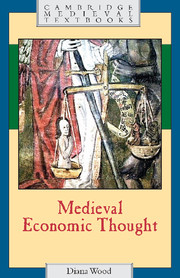Book contents
- Frontmatter
- Contents
- Preface
- List of abbreviations
- Introduction: problems, evidence, and background
- 1 Private property versus communal rights: the conflict of two laws
- 2 Wealth, beggary, and sufficiency
- 3 What is money?
- 4 Sovereign concerns: weights, measures, and coinage
- 5 The mercantile system
- 6 The just price and the just wage
- 7 The nature of usury: the usurer as winner
- 8 The theory of interest: the usurer as loser
- Conclusion
- Appendix: Notes on the main writers and anonymous works mentioned in the text
- Glossary of terms
- Select bibliography
- Index
- Cambridge Medieval Textbooks
Conclusion
Published online by Cambridge University Press: 05 June 2012
- Frontmatter
- Contents
- Preface
- List of abbreviations
- Introduction: problems, evidence, and background
- 1 Private property versus communal rights: the conflict of two laws
- 2 Wealth, beggary, and sufficiency
- 3 What is money?
- 4 Sovereign concerns: weights, measures, and coinage
- 5 The mercantile system
- 6 The just price and the just wage
- 7 The nature of usury: the usurer as winner
- 8 The theory of interest: the usurer as loser
- Conclusion
- Appendix: Notes on the main writers and anonymous works mentioned in the text
- Glossary of terms
- Select bibliography
- Index
- Cambridge Medieval Textbooks
Summary
This book has tried to survey some of the fundamental issues in economic thought as they evolved in the pre-Reformation period and to relate them to economic practice. In a work of synthesis there is no claim to reach original or definitive conclusions, but simply to bring together a few observations.
The period from the twelfth to the fifteenth century was marked by dramatic developments in economic thought and practice within the framework of a changing society. Although still a Christian society in the sense that its members were baptized into the Church, ecclesiastical domination, especially that of pope and priests, was weakening. The laity was assuming a more influential role, and as a result secular concerns and values, both economic and cultural, were becoming as important as sacred ones. In political terms, Europe was fragmenting into a number of independent national states, each fiercely defending its sovereignty. A combination of demographic and monetary factors had led to an acceleration in the economy, demonstrated by an expansion of trade, commerce, and industry, the growth or foundation of towns and markets, and more intensive cultivation of the countryside. The emergence of a new merchant class was a direct result of all this. The famines and epidemics of the fourteenth century, which reversed the population trend and checked economic growth, did not halt commercial progress.
The most important development was that of an increasingly monetized economy, which heralded a transition to secular values. Everything came to have its price.
- Type
- Chapter
- Information
- Medieval Economic Thought , pp. 206 - 209Publisher: Cambridge University PressPrint publication year: 2002



